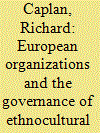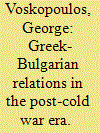| Srl | Item |
| 1 |
ID:
133959


|
|
|
|
|
| Publication |
2014.
|
| Summary/Abstract |
The post-Cold War period to date has witnessed renewed international and especially European preoccupation with issues pertaining to ethnocultural diversity and the challenges for governance arising from these issues. This article discusses the shift that has occurred in support of national minority rights in Europe and why European organizations have become more concerned with these rights after the Cold War. It examines some of the major policy initiatives adopted by European organizations in response to the nearly 25-year long Yugoslav crisis and what these initiatives reveal about new (and old) thinking within these organizations with respect to national minority rights and the management of ethnocultural diversity more generally. It also discusses the consequences of these initiatives for minority rights protection and some of their broader implications for European policy in the future.
|
|
|
|
|
|
|
|
|
|
|
|
|
|
|
|
| 2 |
ID:
085310


|
|
|
|
|
| Publication |
2008.
|
| Summary/Abstract |
The Balkan Peninsula has been an unstable regional security subsystem because of a number of defining and qualitative parameters, namely, overt or covert challenges to the territorial status, interethnic conflicts, the "great idea" syndrome, out-of-system interference, and minority expansionism. In the post-Cold War era, European Union enlargement in the area assisted the establishment of a core of systemic stabilizers that could, under certain conditions, absorb inherent instability. Greece and Bulgaria constitute an axis providing eufunctional input to the regional stability and security equation. Their partnership has been an example of inter-Balkan cooperation and an effort to establish an equilibrium mechanism to enhance the cohesion of the region
|
|
|
|
|
|
|
|
|
|
|
|
|
|
|
|
| 3 |
ID:
072888


|
|
|
|
|
| Publication |
2006.
|
| Summary/Abstract |
The decision to balance against or bandwagon with the United States is heavily influenced by non-material values, especially the perceived status and prestige of the major powers. As a test case, this essay examines the nexus between the US, Russia, and Yugoslavia during the early 1990s. Russia's initial pro-Western foreign policy gave way to a new grand strategy emphasizing Russia's great power status and the independence of its foreign policy. Heavily influenced by non-material values, especially the perceived status and prestige of major powers, the Kremlin's initial, pro-Western foreign policy was deemed unacceptable by a broad spectrum of Russian foreign policy elites not primarily because of perceived threats to Russian security interests, but rather because its Western alignment was seen as incompatible with Russia's desired status as a great power. The emphasis on balancing against the United States continues to this day, corresponding to discontent with the unipolar international system. Why did Russian grand strategy change? What were the long-term effects for Russo-American relations? What, if anything, can the United States do to avoid future balancing behaviour in the other major powers?
|
|
|
|
|
|
|
|
|
|
|
|
|
|
|
|